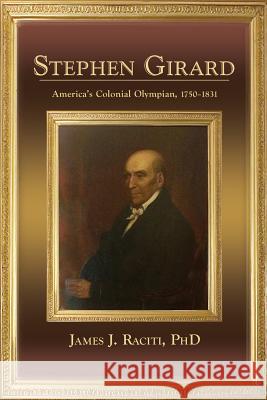Stephen Girard » książka
Stephen Girard
ISBN-13: 9781632930705 / Angielski / Miękka / 2015 / 274 str.
Stephen Girard
ISBN-13: 9781632930705 / Angielski / Miękka / 2015 / 274 str.
(netto: 91,57 VAT: 5%)
Najniższa cena z 30 dni: 94,84
ok. 16-18 dni roboczych.
Darmowa dostawa!
Why is Stephen Girard, a figure from late Colonial America, important today? As a teenager, he left home in Bordeaux, France with meager funds and went to sea as a merchant marine, following his family's tradition. In early summer, 1776, he landed in Philadelphia when a British blockade forced his ship into the city's Delaware River port. With his extraordinary intelligence and with an ability to foresee market trends and grasp the mysteries of international trade, he remained in Philadelphia and became an American citizen. By the early eighteen hundreds he had become the richest man in America. Is this reason enough to pay closer attention to Girard? Why don't American History textbooks mention him? As the first private banker in America, he should be counted among our Founding Fathers. He labored tirelessly and unselfishly during Philadelphia's 1793 yellow fever epidemic, risking his life caring for the sick, sometimes performing the most repulsive tasks. Most wealthy Philadelphians had left the city. In 1811, Great Britain increased its harassment of American ships. Girard put his entire fortune into the hands of the US Treasury to wage war once again with a country that refused to accept America as a sovereign nation. He proved himself a courageous philanthropist and a great patriot. The War of 1812, an American success, forever freed the country from subservience to England. When Girard died in 1831, thousands of Philadelphians showed their love and respect for him. He left most of his fortune to the City of Philadelphia and to founding an institution for poor orphans-Girard College, opening its doors to students in 1848. President Truman visited the college for its centennial in 1948 to honor this remarkable man-a man who walked the streets with Washington, Jefferson and Adams and had flags made by Betsy Ross. * * * James J. Raciti, PhD is a graduate of Girard College and is a direct beneficiary of Stephen Girard's legacy. He has spent more than twenty-five years in Europe as a university educator. His graduate degrees in comparative literature are from the University of Grenoble in France and the University of Zaragoza in Spain. Sunstone Press has published his non-fictional works-"Ask About Santa Fe," "Old Santa Fe" and "Ask About Florida"-as well as his fictional history of Santa Fe, Pulling No Ponchos and a collection of poetry, "The Bird Chart Boy."
Why is Stephen Girard, a figure from late Colonial America, important today? As a teenager, he left home in Bordeaux, France with meager funds and went to sea as a merchant marine, following his familys tradition. In early summer, 1776, he landed in Philadelphia when a British blockade forced his ship into the citys Delaware River port. With his extraordinary intelligence and with an ability to foresee market trends and grasp the mysteries of international trade, he remained in Philadelphia and became an American citizen. By the early eighteen hundreds he had become the richest man in America. Is this reason enough to pay closer attention to Girard? Why dont American History textbooks mention him? As the first private banker in America, he should be counted among our Founding Fathers. He labored tirelessly and unselfishly during Philadelphias 1793 yellow fever epidemic, risking his life caring for the sick, sometimes performing the most repulsive tasks. Most wealthy Philadelphians had left the city. In 1811, Great Britain increased its harassment of American ships. Girard put his entire fortune into the hands of the US Treasury to wage war once again with a country that refused to accept America as a sovereign nation. He proved himself a courageous philanthropist and a great patriot. The War of 1812, an American success, forever freed the country from subservience to England. When Girard died in 1831, thousands of Philadelphians showed their love and respect for him. He left most of his fortune to the City of Philadelphia and to founding an institution for poor orphans-Girard College, opening its doors to students in 1848. President Truman visited the college for its centennial in 1948 to honor this remarkable man-a man who walked the streets with Washington, Jefferson and Adams and had flags made by Betsy Ross. * * * James J. Raciti, PhD is a graduate of Girard College and is a direct beneficiary of Stephen Girards legacy. He has spent more than twenty-five years in Europe as a university educator. His graduate degrees in comparative literature are from the University of Grenoble in France and the University of Zaragoza in Spain. Sunstone Press has published his non-fictional works-"Ask About Santa Fe," "Old Santa Fe" and "Ask About Florida"-as well as his fictional history of Santa Fe, Pulling No Ponchos and a collection of poetry, "The Bird Chart Boy."











